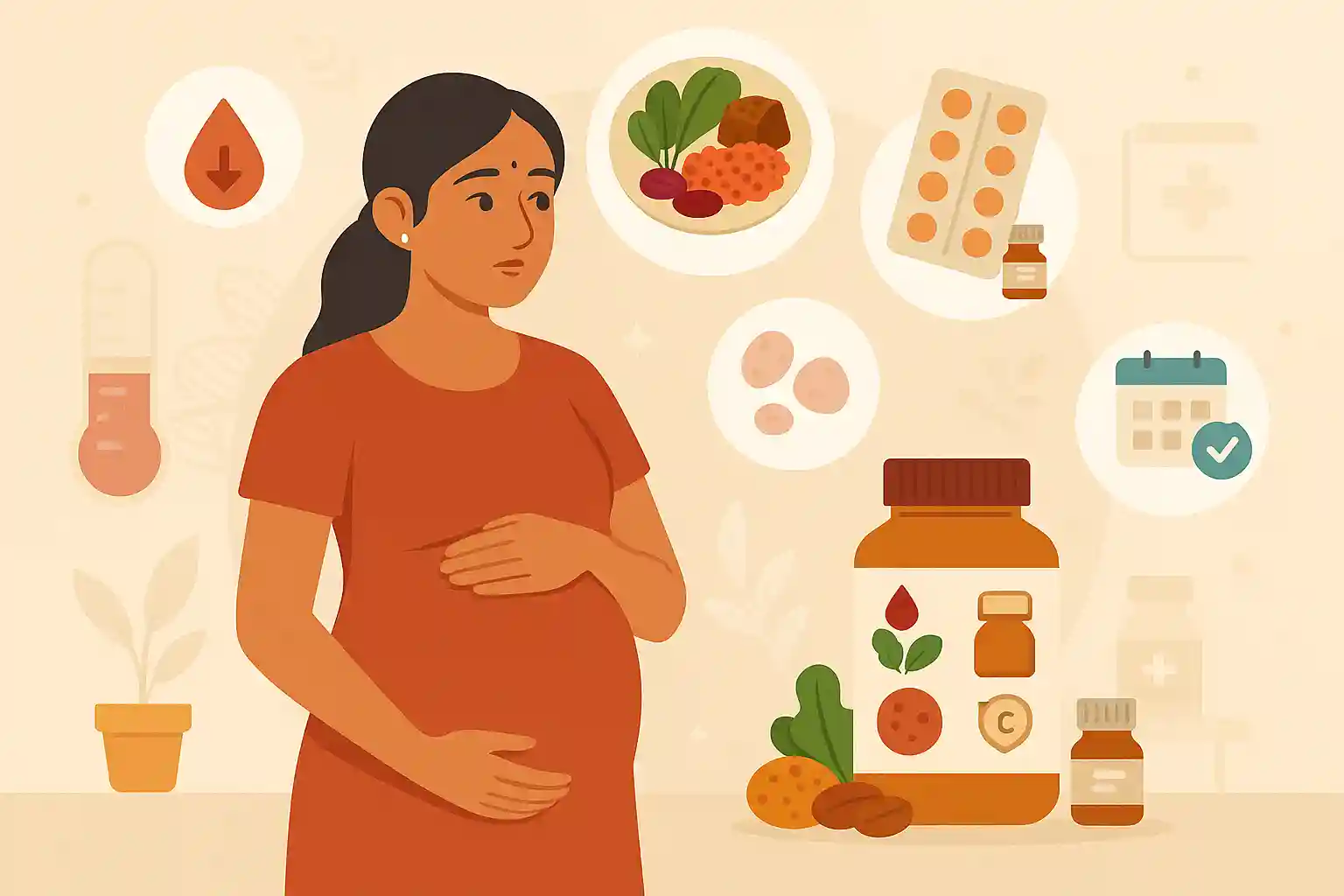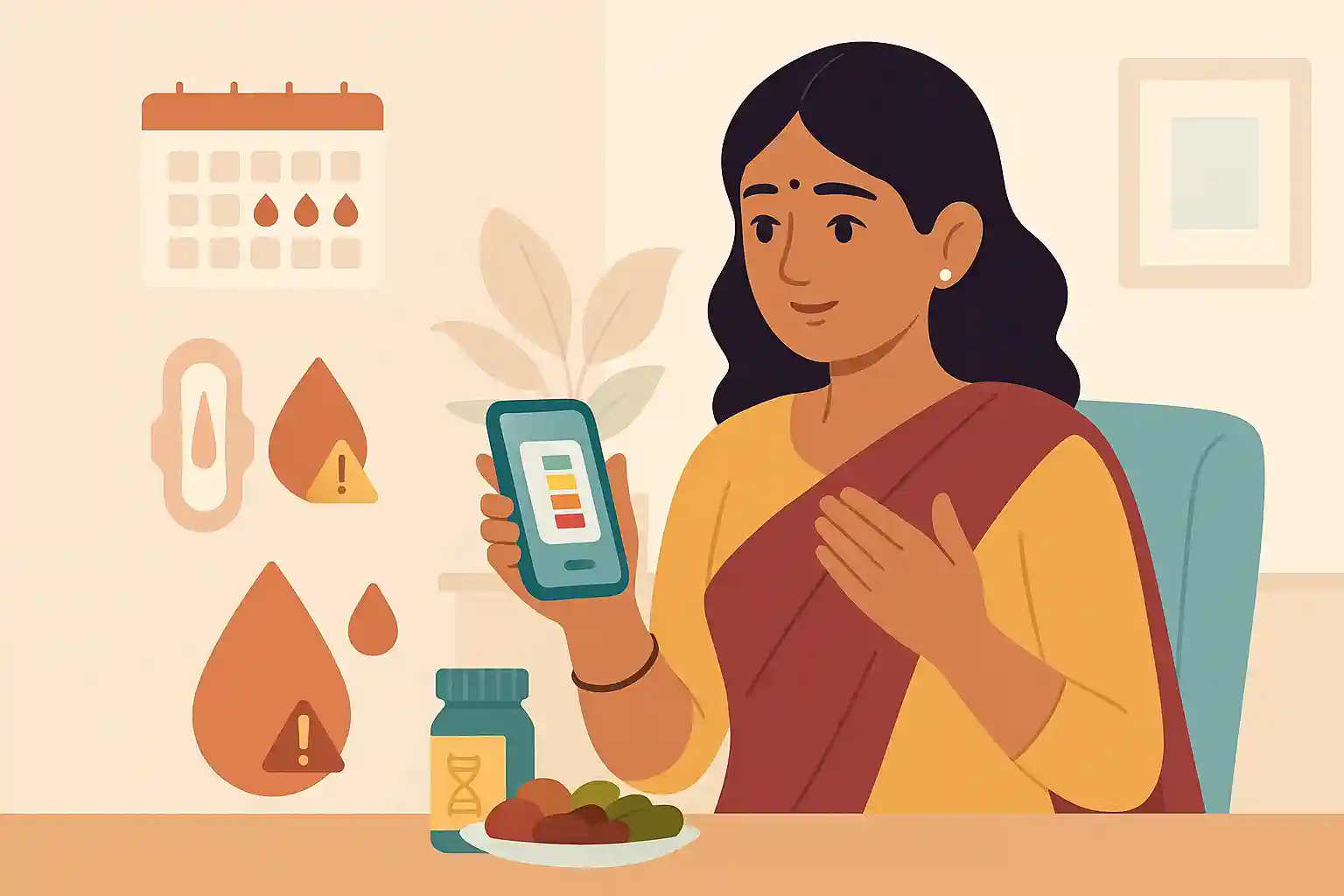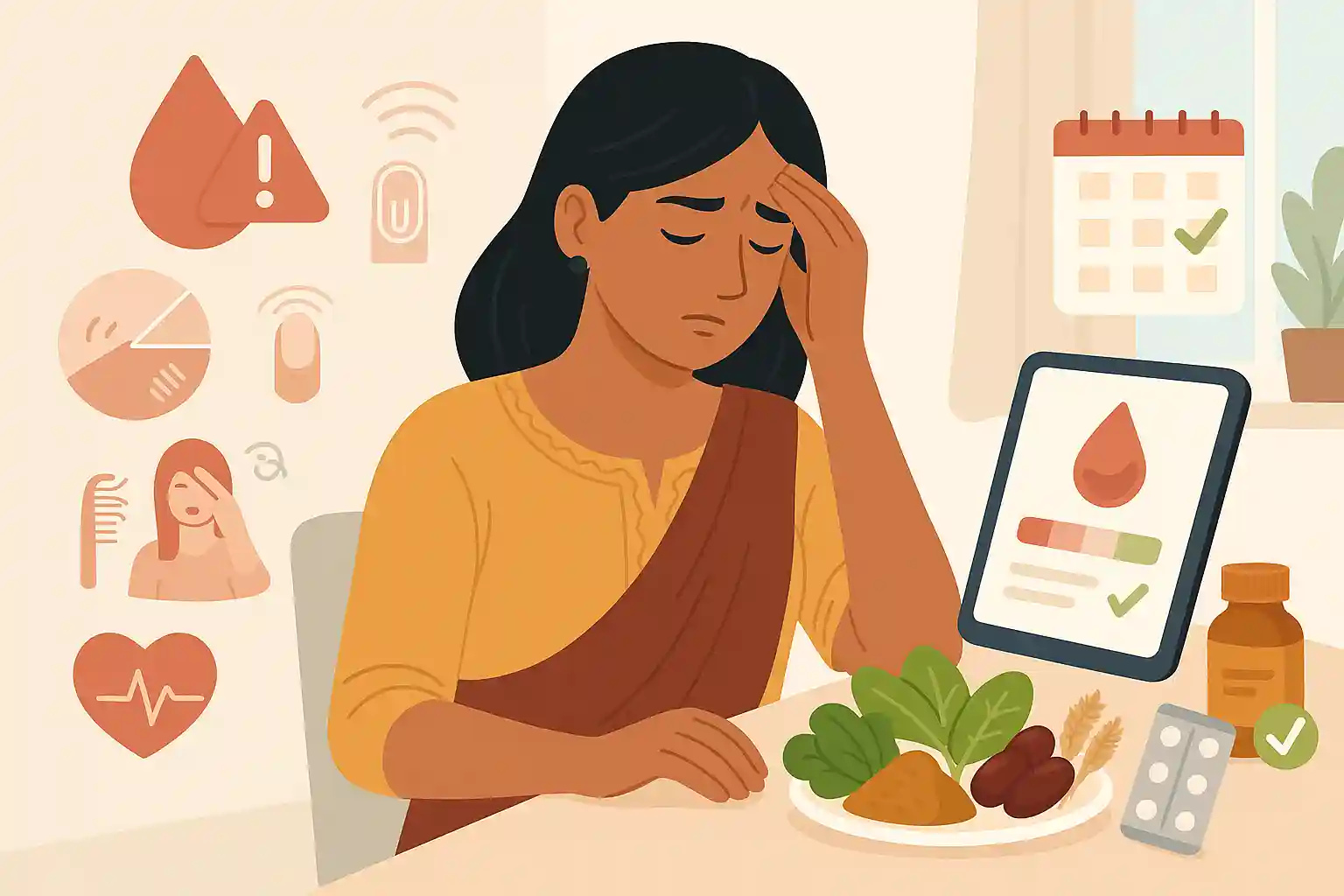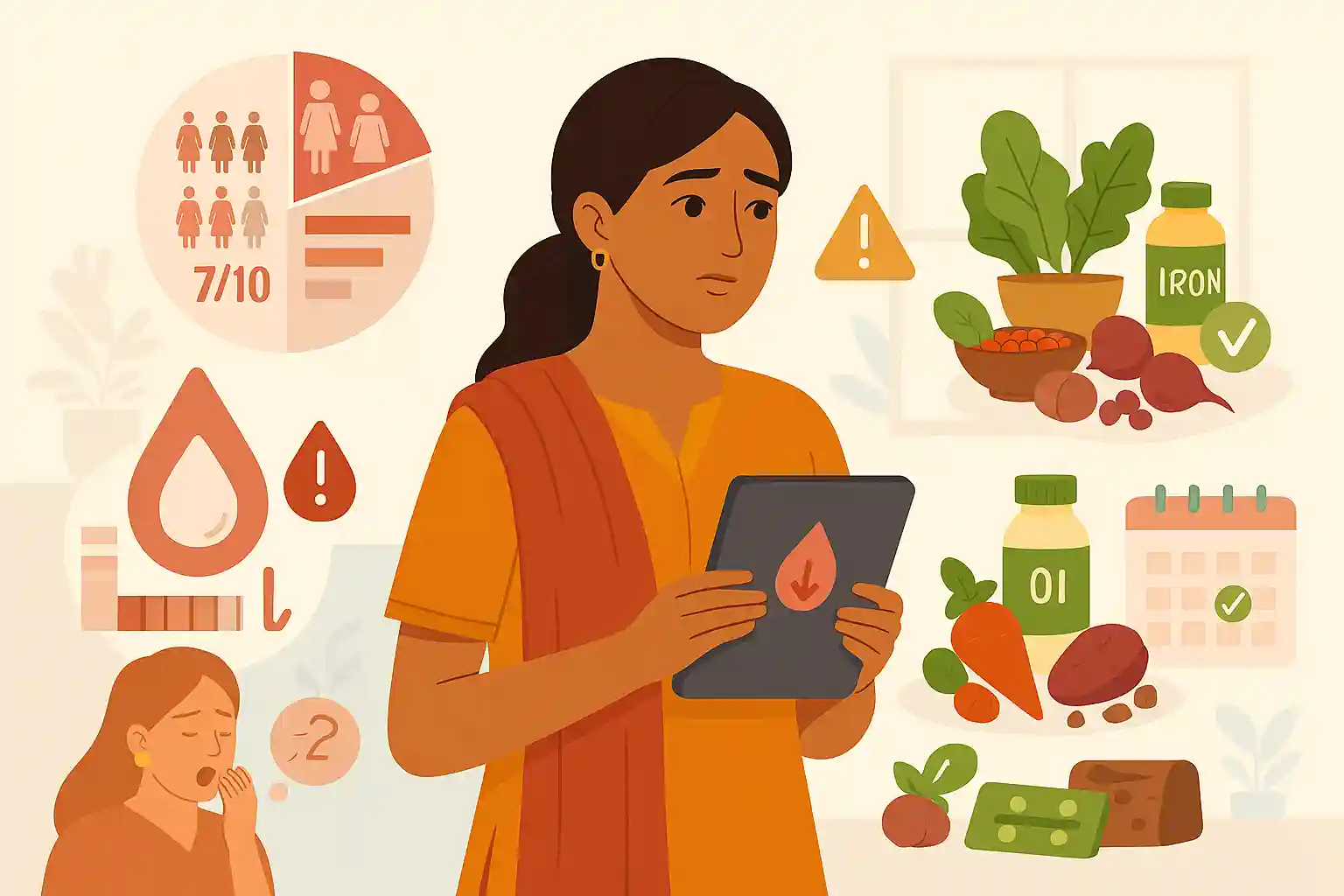Anemia during pregnancy is a significant health concern in India, affecting more than 50% of pregnant women according to national health surveys. This condition, characterized by low levels of healthy red blood cells or hemoglobin, can have serious consequences for both mother and baby. Understanding the causes, symptoms, and prevention strategies specific to the Indian context is crucial for ensuring healthy pregnancies and reducing maternal and infant mortality rates.
Understanding Anemia in Pregnancy
Anemia occurs when your blood doesn't have enough healthy red blood cells to carry adequate oxygen to your body's tissues. During pregnancy, your blood volume increases by about 50%, requiring more iron to produce additional red blood cells for you and your growing baby.
Hemoglobin levels defining anemia in pregnancy:
- First trimester: Below 11.0 g/dL
- Second trimester: Below 10.5 g/dL
- Third trimester: Below 11.0 g/dL
- Severe anemia: Below 7.0 g/dL (requires immediate medical attention)
Why is Anemia So Common in Indian Pregnant Women?
Several factors contribute to the high prevalence of anemia among pregnant women in India:
- Pre-pregnancy iron deficiency due to poor dietary intake
- Heavy menstrual periods before pregnancy depleting iron stores
- Vegetarian diets with limited bioavailable iron sources
- Poor absorption of iron due to consuming tea/coffee with meals
- Early and frequent pregnancies without adequate recovery time
- Poverty and limited access to nutritious foods
- Cultural food practices that may limit iron absorption
- Worm infestations common in certain regions
Types of Anemia in Pregnancy
The most common types affecting Indian pregnant women include:
Iron Deficiency Anemia (Most Common - 90% of cases):
- Caused by insufficient iron intake or absorption
- Worsened by increased iron needs during pregnancy
- Most preventable and treatable type
Folate Deficiency Anemia:
- Due to inadequate folic acid intake
- Can lead to neural tube defects in babies
- Common in diets lacking green leafy vegetables
Vitamin B12 Deficiency Anemia:
- More common in strict vegetarians
- Can cause neurological problems
- Requires medical supervision for treatment
Recognizing the Symptoms
Many women dismiss anemia symptoms as normal pregnancy discomforts. Watch for these warning signs:
Early Symptoms:
- Unusual fatigue and weakness
- Pale skin, nails, or inner eyelids
- Shortness of breath during normal activities
- Dizziness or lightheadedness
- Cold hands and feet
Severe Symptoms (Require Immediate Medical Attention):
- Rapid or irregular heartbeat
- Chest pain
- Severe breathlessness
- Fainting spells
- Cravings for non-food items (ice, starch, dirt)
Consequences of Untreated Anemia
Anemia during pregnancy can lead to serious complications:
For the Mother:
- Increased risk of infections
- Excessive bleeding during delivery
- Need for blood transfusion
- Postpartum depression
- Reduced ability to tolerate blood loss during childbirth
For the Baby:
- Low birth weight
- Premature birth
- Iron deficiency in infancy
- Developmental delays
- Increased risk of infections in early life
Iron-Rich Foods for Indian Pregnant Women
Incorporating iron-rich foods into traditional Indian diets can help prevent and treat anemia:
Vegetarian Iron Sources (Non-Heme Iron):
- Dark green leafy vegetables: Spinach, fenugreek leaves, amaranth
- Legumes: Lentils (masoor), chickpeas, kidney beans
- Fortified cereals and whole grains
- Nuts and seeds: Almonds, sesame seeds, pumpkin seeds
- Dried fruits: Dates, raisins, apricots
- Jaggery and molasses
Non-Vegetarian Iron Sources (Heme Iron - Better Absorbed):
- Lean red meat
- Chicken and turkey
- Fish (especially sardines and mackerel)
- Eggs (particularly egg yolks)
- Organ meats (if culturally acceptable)
Enhancing Iron Absorption: Indian Kitchen Tips
Maximize iron absorption with these practical strategies:
Foods That Enhance Iron Absorption:
- Vitamin C-rich foods: Amla, guava, tomatoes, lime juice
- Combine dal with tomato-based preparations
- Add lemon juice to spinach dishes
- Include bell peppers and cabbage in meals
- Fermented foods: Idli, dosa (enhance mineral absorption)
Foods That Block Iron Absorption (Avoid with Iron-Rich Meals):
- Tea and coffee (wait 1-2 hours after meals)
- Calcium-rich foods when taken in large amounts
- Whole grains with high phytate content (unless fermented)
- Excessive fiber intake at the same meal
Medical Treatment and Supplements
Most pregnant women need iron supplements in addition to dietary sources:
Standard Supplementation:
- Iron: 100-200mg daily (as prescribed by doctor)
- Folic acid: 400-800 mcg daily
- Vitamin B12: If deficient (especially for vegetarians)
- Vitamin C: To enhance iron absorption
Taking Iron Supplements Effectively:
- Take on empty stomach if tolerated
- Take with vitamin C source (orange juice, amla juice)
- Avoid with tea, coffee, or milk
- Take at bedtime to reduce nausea
- Don't take with calcium supplements
Managing Side Effects of Iron Supplements
Common side effects and management strategies:
- Nausea: Take with small amount of food or at bedtime
- Constipation: Increase fiber intake, drink more water
- Dark stools: Normal and harmless side effect
- Stomach upset: Try different iron formulations
- Metallic taste: Take with juice or after brushing teeth
Prevention Strategies
Start preventing anemia before pregnancy and continue throughout:
Pre-Pregnancy:
- Build iron stores through balanced diet
- Take folic acid supplements while planning pregnancy
- Treat any underlying conditions affecting absorption
- Space pregnancies adequately (at least 2-3 years apart)
During Pregnancy:
- Start prenatal vitamins early
- Follow prescribed supplement regimen consistently
- Maintain iron-rich diet throughout pregnancy
- Attend all prenatal check-ups for monitoring
- Treat infections promptly
When to Seek Medical Help
Contact your healthcare provider immediately if you experience:
- Severe fatigue that interferes with daily activities
- Rapid heartbeat or chest pain
- Difficulty breathing during rest
- Dizziness or fainting spells
- Severe headaches
- Signs of infection (fever, chills)
- Unusual cravings for non-food items
Government Initiatives and Support
Take advantage of available government programs:
- Janani Suraksha Yojana: Provides iron and folic acid supplements
- Anganwadi services: Nutritional support and monitoring
- Public health centers: Free anemia testing and treatment
- ICDS programs: Supplementary nutrition for pregnant women
- Pradhan Mantri Matru Vandana Yojana: Financial support for nutrition
The Road to Healthy Pregnancy
Anemia in pregnancy is largely preventable and treatable with proper knowledge, nutrition, and medical care. By understanding the unique challenges faced by Indian women and adapting prevention strategies to local dietary patterns and cultural practices, we can significantly reduce the burden of maternal anemia.
Remember that treating anemia takes time—hemoglobin levels typically improve after 4-6 weeks of consistent iron supplementation. Work closely with your healthcare provider to monitor progress and adjust treatment as needed. Also you can use at-home monitoring tools to keep track of your symptoms and progress. With proper care and attention, you can ensure a healthy pregnancy for both you and your baby.
Every woman deserves access to information and resources needed for a healthy pregnancy. Don't hesitate to seek help, ask questions, and advocate for your health. Your well-being and that of your baby depend on taking anemia seriously and addressing it promptly.



